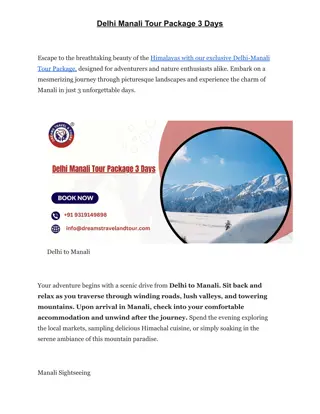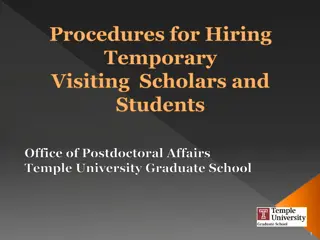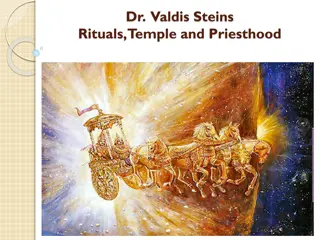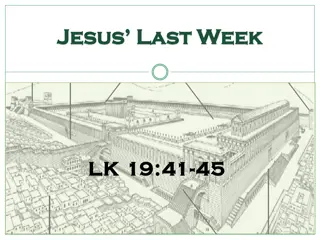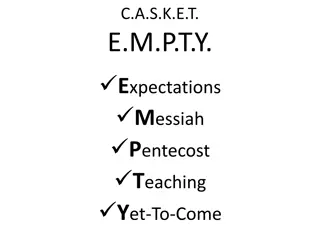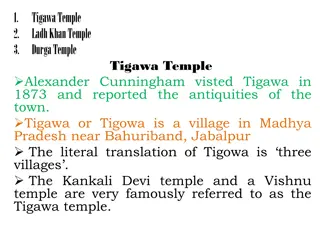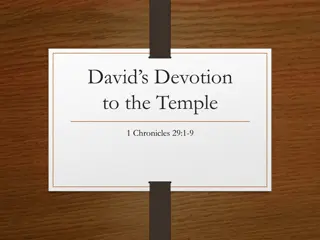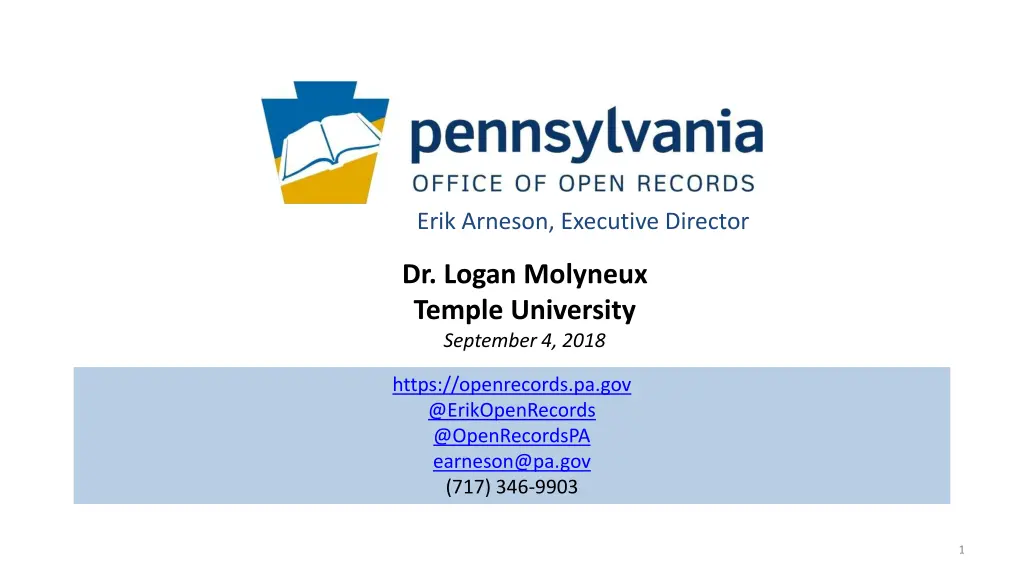
Understanding Pennsylvania Right-to-Know Law: Records Analysis and Office of Open Records
Explore the application of Pennsylvania Right-to-Know Law (RTKL) on various types of records, including agency budgets, emails, video recordings, detective notes, and databases. Learn about the Office of Open Records (OOR) and key legal concepts surrounding government transparency and public access to information.
Download Presentation

Please find below an Image/Link to download the presentation.
The content on the website is provided AS IS for your information and personal use only. It may not be sold, licensed, or shared on other websites without obtaining consent from the author. If you encounter any issues during the download, it is possible that the publisher has removed the file from their server.
You are allowed to download the files provided on this website for personal or commercial use, subject to the condition that they are used lawfully. All files are the property of their respective owners.
The content on the website is provided AS IS for your information and personal use only. It may not be sold, licensed, or shared on other websites without obtaining consent from the author.
E N D
Presentation Transcript
Erik Arneson, Executive Director Dr. Logan Molyneux Temple University September 4, 2018 https://openrecords.pa.gov @ErikOpenRecords @OpenRecordsPA earneson@pa.gov (717) 346-9903 1
A Brief History RTKL introduced 3/29/2007, signed 2/14/2008, eff. 1/1/2009 Senator Dominic Pileggi, new majority leader SB 1 Existing RTK Act presumed gov t records were not public Requester had to prove public nature & all appeals went to court Basically limited to financial records Act 3 of 2008 complete rewrite, new RTKL Flipped presumption Created Office of Open Records (free appeals) 3
The Office of Open Records OOR is an independent, quasi-judicial agency Executive Director = 6-year term, max 2 terms 2008: Gov. Rendell appointed Terry Mutchler, first ED 2014: Gov. Corbett didn t make an appointment Jan. 2015: Gov. Corbett appointed Erik Arneson Jan. 2015: Gov. Wolf sworn in, fired Erik Arneson Arneson v. Wolf went to PA Supreme Court Court held that Executive Director can only be fired for cause 4
Right-to-Know Law Basics All state & local government records presumed to be public 30 exceptions in the RTKL Fewer apply to financial records & aggregated data Exceptions in other laws & regulations Attorney-client privilege & other privileges Only if recognized by PA courts; not self-critical evaluation Records can be made non-public by court order 5
Which of These are Records? Which of these do you think are records under the RTKL? 1. An agency s budget for FY 2018-19 2. Inappropriate emails sent to a co-worker on gov t computer 3. Video recording of a city council meeting 4. Police detective s interview notes 5. Database of lead tests done by city w/ home addresses 6
Which of These are Records? Which of these do you think are records under the RTKL? 1. An agency s budget for FY 2018-19 2. Inappropriate emails sent to a co-worker on gov t computer 3. Video recording of a city council meeting 4. Police detective s interview notes 5. Database of lead tests done by city w/ addresses OOR ordered 100 block of Pine St. rather than specific addresses Currently pending in Allegheny County Court of Common Pleas 7
What is a Record? A record is information, regardless of physical form or characteristics, that documents a transaction or activity of an agency and that is created, received or retained pursuant to law or in connection with a transaction, business or activity of the agency PA Office of Attorney General v. Philadelphia Inquirer Personal communications, even if they violate agency policies, are not records under the RTKL 8
Records Take Many Shapes The Right-to-Know Law Doesn t distinguish between formats Paper, email, texts, social media, audio, video, etc. Doesn t distinguish between agency & personal devices (or agency & personal email accounts) Practical issues re: accessing personal devices & email Best practice: Agency business done on agency devices & email Bottom line: Is it a record? And if so, is it a public record? 9
How to File a RTK Request Submit your RTK request to the correct agency Submit requests to the agency that has the record (generally not the OOR) Address requests to Agency Open Records Officer (AORO) AORO database available on OOR website 10
More About Agency AOROs Many agencies, but not all, have a single AORO Some agencies have separate AOROs by bureau, dep t, etc. Commonwealth agencies: DEP, DCNR, DOC, DCED, etc. Philadelphia has a Right-to-Know Law policy Approximately 40 AOROs Very important to send request to the right AORO If not sure, say so: If this request is misdirected, please let me know as soon as possible so that I can withdrawn this request and direct it to the proper AORO. 11
How to File a RTK Request Basic steps include: Use the appropriate form to request records Agencies may have their own form, but must accept OOR s Standard RTK Request Form Be specific when describing records: subject matter, date range, type of record, etc. Requests can be emailed, mailed, faxed, or hand delivered Make a note of request date 12
How to File a RTK Request OOR Standard RTK Request Form, part 1 13
How to File a RTK Request OOR Standard RTK Request Form, part 2 14
Writing a Good RTK Request: 1. Seek Records, Don t Ask Questions Requests should seek access to records, not ask questions Why did the Chairman vote yes? Request meeting minutes & audio recording of meeting Why did Pileggi Lumber get this contract? Request copies of submitted bids & council emails re: Pileggi Lumber How many times was Pine Street plowed in January? Request plowing schedule & records of any modifications Agencies may deny requests which ask questions 15
Writing a Good RTK Request: 2. Be Specific Specificity is determined on a case-by-case basis Primary goal is to enable agency to know what to look for Vast fishing expeditions are not permitted (hook vs. net) Phrases like any and all & but not limited to raise questions Any and all documents, including but not limited to emails, memos, and spreadsheets, regarding the 2018 Pine Street Bridge Project Poor storage & organization of an agency s records is not held against the requester (Dep t of Envtl. Prot. v. Legere) 16
More About Specificity Specificity is a 3-part test: Pa. Dep t of Educ. v. Post-Gazette Subject Matter: Must identify the transaction or activity of the agency for which the record is sought Scope: Must identify a discrete group of documents (e.g., type or recipient) Timeframe: Should identify a finite period of time for which the records are sought The most fluid factor failure to identify a finite timeframe will not automatically render a sufficiently specific request overbroad & a short timeframe will not transform an overbroad request into a specific one 17
Specificity: Examples Commonwealth Court cases on specificity: Pa. Dep t of Educ. v. Pittsburgh Post-Gazette: A request seeking all of the emails of Acting Secretary of Education Carolyn Dumaresq as they pertain to the performance of her duties as Acting Secretary since she was appointed on Aug. 25, 2013 to date [Aug. 5, 2014] was insufficiently specific because it is, by virtue of the Secretary s position, a request for emails about all of the agency s activity over nearly a one-year period. In other words, it is a fishing expedition 18
Specificity: Examples Commonwealth Court cases on specificity: Dep t of Envtl. Prot. v. Legere: A request for 4 years of Section 208 determination letters was sufficiently specific because the subject matter was extremely specific Dep t of Corr. v. St. Hilaire: A request for all records documenting inmate injuries or death for five years was sufficiently specific because the request had clear parameters even though a large number of records were implicated 19
Specificity: Examples Commonwealth Court cases on specificity: Office of the Governor v. Engelkemier: Request for all emails from Chief of Staff Katie McGinty from January 2015 to July 2015, with keywords, was sufficiently specific but note discussion about Office waiving specificity argument earlier in the process and potential for broad keywords to be insufficiently specific Keywords can be helpful, but use caution 20
Writing a Good RTK Request: 3. Think Twice Before Requesting a List Requesting a list can be problematic If no actual list exists, agency not required to create one List of all lawsuits filed against the agency in 2017 List of all properties with zoning violations, 2015 to present Better to seek records containing the information you want Records showing captions of lawsuits filed against agency in 2017 Records showing zoning violations issued, 2015 to present Valid to add: If info can be provided in a list, that s preferred 21
Writing a Good RTK Request: 4. Accessing Information in Databases Information in databases subject to presumption of openness Terminology is vital try to use agency jargon Create, export, compile, format, CSV, TXT, comma-delimited Database software used by the agency If possible, learn capabilities of program/database ask if unsure How do agency employees extract info from database Where relevant, consider the use of suggested queries Queries may be necessary for extracting information 22
Databases: Commonwealth Court Gingrich v. Pennsylvania Game Commission (2012) Requesters may provide suggestions or examples in order to better inform an agency about the information requested, and we have no desire to discourage that practice. Providing data from an agency database does not constitute creating a record. [I]nformation contained in a database must be accessible to requesters and provided in a format available to the agency. 23
Databases: Commonwealth Court Department of Environmental Protection v. Cole (2012) Commonwealth Court: [A]n agency can be required to draw information from a database, although the information must be drawn in formats available to the agency. In short, to the extent requested information exists in a database, it must be provided To hold otherwise would encourage an agency to avoid disclosing public records by putting information into electronic databases. 24
Databases: Additional Cases Intersection of RTKL & databases still being developed Agency may be made to prove query was properly structured OOR 2017-1761: Violent crime data from Pittsburgh Don t be overly specific & hurt your request OOR 2016-2041: Sought TXT or CSV, records only exist in PDF Law currently only specifies electronic vs. hard copy OOR 2017-0246: Sought comma- or tab-delimited, provided in PDF 25
Speaking of Databases Two useful resources: Online Contract Database, http://contracts.patreasury.gov/ State agency contracts of $5,000 or more PennWATCH, http://pennwatch.pa.gov/ State employee salaries & compensation State agency employee counts Basic state budget data 26
Tip: Communicate with the Agency Good communication can prevent & solve many issues Good practice to let agency know you re willing to talk Requesters often submit broad requests to ensure they get all the records they want Understandable, but can be expensive & frustrating Requesters don t want surprise bills Agencies don t want unnecessary work Many agencies willing to discuss requests If agreement reached on revised request, put it in writing 27
Tip: Communicate with the Agency Reason for making RTKL request Agency cannot require requester to provide reason for request They can ask, but requester can decline to answer However, requester may sometimes want to provide info Can help agency understand request & speed response Can help reduce number of valueless records received Can reduce cost if hard copies must be made 28
Timeline of a RTKL Response Every state & local agency must respond to RTK requests Must respond in writing within 5 (agency) business days If no response received, request is deemed denied Allow additional 3 business days for postal mail before filing appeal Agency can extend timeline by 30 calendar days Any other extension must be agreed to by requester & in writing Be cautious with rolling production schedules Response: grant, deny, or a mix of both 29
Agency Response: Extensions Agencies can invoke a 30-day extension Within the initial 5-day window, an agency can invoke a 30 calendar day extension for reasons listed in RTKL If the agency does this, the requester must be notified in writing, with a reason and a date to expect a response Track all dates & deadlines in case you need to appeal 30
Tracking Dates: An Example Merlin / Morning Call v. Easton Area SD (2008-1065) March 23, 2018 request made March 29, 2018 agency took 30-day extension (to May 3) School had multiple snow days during initial 5 business day window May 17, 2018 agency claimed another 30-day extension June 1, 2018 agency issued response (part grant, part denial) June 12, 2018 requester filed appeal with OOR OOR has no choice but to dismiss case as untimely 31
Agency Response: Costs & Format OOR fee schedule developed pursuant to RTKL No charge for electronic records Redactions may necessitate printing electronic records Up to $0.25/page for hard copies (8.5 x 11, b&w) Requesters can photograph records Agencies required to provide records in medium requested (electronic vs. hard copy), do not have to create a record 32
Agency Response: Denials If an agency denies a request, it must: Provide the denial in writing Explain what records are being withheld Explain why records are being withheld Explain how to appeal the denial Failure to respond by statutory deadline (or agreed-to extension) is a deemed denial & can be appealed 33
Appealing a RTKL Denial Most denials can be appealed to the OOR If request is denied, appeal can be filed within 15 business days Most appeals filed with the OOR Not Attorney General, Auditor General, Treasurer, General Assembly Not Courts (requests & appeals governed by Rule 509) Denials from local agencies based on criminal investigatory records appealed to county DA (but PSP denials appealed to OOR) Can also appeal redactions (which are denials) & fees 34
Criminal Investigative Records of a Local Law Enforcement Agency Section 503(d)(2): The district attorney of a county shall designate one or more appeals officers to hear appeals relating to access to criminal investigative records in possession of a local agency of that county OOR transfers such cases to the DA Can file concurrent appeals, esp. if multiple issues involved OOR hears cases involving PSP 35
How to Appeal a RTKL Denial OOR appeal process designed to be simple File appeals using online form at OOR website About 10 to 15 minutes to fill out No lawyer necessary OOR assigns Appeals Officer to oversee case Both sides can present evidence & argument OOR has 30 days to issue Final Determination 36
Tip: Consider Requesting Mediation RTKL authorizes OOR to establish informal mediation program Goal: Mutually agreeable settlement Voluntary & confidential Either side can end mediation at any time If mediation ends, case moves to normal appeal process (new AO) OOR has trained mediators Can save time & expense 40
Requesting Police Recordings RTKL does not apply to police recordings Act 22 of 2017 covers police video & audio recordings Agency has 30 days to respond, may deny for various reasons Denials may be appealed within 30 days to court; $125 fee Law enforcement agencies & DAs have fairly broad discretion to release a recording (with or without a written request). More info on OOR website 41
Office of Open Records Created by RTKL: Independent & quasi-judicial Decide appeals filed by people denied access to records (approx. 2,400 per year) Provide RTKL & Sunshine Act training 18 total staff Executive Director & Deputy Director 12 Attorneys (incl. 10 Appeals Officers) Chief of Training & Outreach 3 Administrative 42
OOR Caseload Thousands of RTK appeals filed every year In 2017, OOR heard 2,434 appeals That s total appeals, not total requests No central database of # of requests LBFC Study estimated 109,000 requests received by state & local agencies, combined, in 2016 43
Cost of the RTKL Legislative Budget & Finance Committee: Study released in 2018 (data covering calendar year 2016) 54% of agencies reported $500 or less annual cost 92% of agencies reported $10,000 or less Total cost (all agencies, 2016) ~ $5.7 million to $9.7 million Median cost = $500 > 6,000 agencies, so avg. cost = $950 to $1,617 per agency 44
Potential Amendments to the RTKL SB 465 & SB 466 (Blake), also numerous other bills Many potential amendments generally agreed to Inmate requests limited to certain categories of records New fees for commercial requests (excludes media) Campus police department = local agency 708(b)(17) does not apply to final safety inspections Require preservation of records after a request Courts can fine agencies $500/day for ignoring an OOR order 45
OOR Resources Website, Twitter, Email Lists & More Web: https://openrecords.pa.gov Blog: https://openrecordspa.wordpress.com/ Email lists: Daily Digest of FDs & General Updates https://www.openrecords.pa.gov/EmailSubscriptions.cfm Twitter: @OpenRecordsPA Executive Director: @ErikOpenRecords YouTube Channel Open Records in PA Podcast: Apple Podcasts, Stitcher, etc. 46





